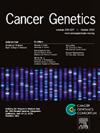Omics approaches: Role in acute myeloid leukemia biomarker discovery and therapy
IF 1.4
4区 医学
Q4 GENETICS & HEREDITY
引用次数: 0
Abstract
Acute myeloid leukemia (AML) is the most common acute leukemia in adults and has the highest fatality rate. Patients aged 65 and above exhibit the poorest prognosis, with a mere 30 % survival rate within one year. One important issue in optimizing outcomes for AML patients is their limited ability to predict responses to specific therapies, response duration, and likelihood of relapse. Despite rigorous therapeutic interventions, a significant proportion of patients experience relapse. Consequently, there is a pressing need to introduce new targets for therapy. Sequencing and biotechnology have come a long way in the last ten years. This has made it easier for many omics technologies, like genomics, transcriptomics, proteomics, and metabolomics, to study molecular mechanisms of AML. An integrative approach is necessary to understand a complex biological process fully and offers an important opportunity to understand the information underlying diseases. In this review, we studied papers published between 2010 and 2024 employing omics approaches encompassing diagnosis, prognosis, and risk stratification of AML. Finally, we discuss prospects and challenges in applying -omics technologies to the discovery of novel biomarkers and therapy targets. Our review may be helpful for omics researchers who want to study AML from different molecular aspects.
组学方法:在急性髓系白血病生物标志物发现和治疗中的作用。
急性髓性白血病(AML)是成人中最常见的急性白血病,死亡率最高。65岁及以上的患者预后最差,一年内生存率仅为30%。优化AML患者预后的一个重要问题是他们预测对特定治疗的反应、反应持续时间和复发可能性的能力有限。尽管采取了严格的治疗干预措施,但仍有相当比例的患者复发。因此,迫切需要引入新的治疗靶点。测序和生物技术在过去十年中取得了长足的进步。这使得许多组学技术,如基因组学、转录组学、蛋白质组学和代谢组学,更容易研究AML的分子机制。综合方法对于全面了解复杂的生物学过程是必要的,并且为了解疾病的基础信息提供了重要的机会。在本综述中,我们研究了2010年至2024年间发表的采用组学方法的论文,包括AML的诊断、预后和风险分层。最后,我们讨论了应用组学技术发现新的生物标志物和治疗靶点的前景和挑战。我们的综述可能对希望从不同分子角度研究AML的组学研究者有所帮助。
本文章由计算机程序翻译,如有差异,请以英文原文为准。
求助全文
约1分钟内获得全文
求助全文
来源期刊

Cancer Genetics
ONCOLOGY-GENETICS & HEREDITY
CiteScore
3.20
自引率
5.30%
发文量
167
审稿时长
27 days
期刊介绍:
The aim of Cancer Genetics is to publish high quality scientific papers on the cellular, genetic and molecular aspects of cancer, including cancer predisposition and clinical diagnostic applications. Specific areas of interest include descriptions of new chromosomal, molecular or epigenetic alterations in benign and malignant diseases; novel laboratory approaches for identification and characterization of chromosomal rearrangements or genomic alterations in cancer cells; correlation of genetic changes with pathology and clinical presentation; and the molecular genetics of cancer predisposition. To reach a basic science and clinical multidisciplinary audience, we welcome original full-length articles, reviews, meeting summaries, brief reports, and letters to the editor.
 求助内容:
求助内容: 应助结果提醒方式:
应助结果提醒方式:


